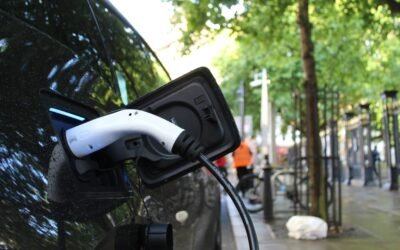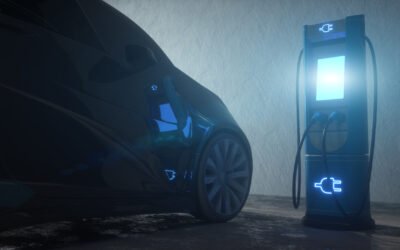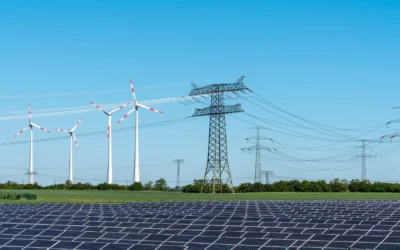The All-Energy Conference is an annual event that brings together various market leaders, and technological innovators driving the world’s transition towards green technology and a sustainable future. This year’s conference, held in Glasgow, United Kingdom, highlighted not only the various technological advancements being carried out in several industries, from topics surrounding clean energy generation, but also topics regarding efficient transmission and supply chain solutions. The conference this year was host to a total of 250 exhibitors, including names such as ABB, BayWa r.e., Bosch, and Tesla.
This year’s conference revolved around increasing the efficiency and utilization rates of renewable energy deployments within the United Kingdom and Europe as a whole. The keynote speech featured insights from individuals from Shell, Scotland’s Ministry for Climate Change, as well as the newly elected First Minister of Scotland, Humza Yusuf. The narrative of the speech and conference holistically surrounded the recent geo-political issues currently inhibiting the transition towards green technology – however the narrative was not to analyze the effect of such issues only, but to also find solutions that could effectively move around issues and efficiently deploy green technology within the world. Emphasis was placed on taking into consideration the potential current conventional industries and technologies had, and how to effectively utilize them to help accelerate the green transition, phrased as Just Transition by the First Minister.
Even with the addition of multiple viewpoints and ideas, there was one idea that remained unanimous throughout the conference – the idea that the time for recommendations and talks was now over. Shell UK emphasized the fragility of the current energy system within the United Kingdom, and hence, the importance shifting to reliable, green forms of generation. However, even these shifts within generation may not be possible if certain conventional energy generation forms are demonized. Gas and the Low Carbon Business model, as quoted by the company, is currently being seen as imperative to facilitate the country, and region’s transition towards renewable energy. Very much along the lines of other countries within Europe, it was made evident through the speeches and conversations going around at the conference this year that to achieve a 100% Renewable generation system, it must be assisted initially by Non-Renewable forms of generation as well. Even with technological advancements being made within the Battery Energy Storage System space, the role gas will have to play will be crucial to assist current energy and grid systems. As quoted by the Ministry of Climate Change, “disposable plants along with hydrogen, and Gas CCS, is necessary to have within the system by 2035, including CO2 Storage, transport, Hydrogen transport and storage, all of which are elements that need to be effectively planned out”.
Going within the specifics of the conference, three main elements were core to the conversations happening – Battery Energy Storage Systems, Supply Chain and Material Costs, and Hydrogen.
With regards to Battery Energy Storage Systems, a few factors were raised by manufacturers that were currently inhibiting the efficient rollout of facilities, most notably problems with grid planning connection requirements. Due to this and certain delays in supply chain, most companies are currently experiencing delays in lead times, often up to 3x of normal durations. Currently the transmission operators and distributors cannot deal with the huge demand. DNO Connections to utilities are not easy which is why governmental organizations and regulatory bodies will have to change something otherwise targets will not be met. Specific to the United Kingdom, many manufacturers are looking towards the government to provide some form of clarity in terms of incentives and subsidies that are to be provided. The market, currently, is policy-led within Europe, and the prospect of allowing the market to develop solely based on market-led deployments is not effective. Speaking from an in-depth transformer point of view, the concept of Smart Transformers may serve as a Hail Mary for many of the problems being faced within the realm of energy generation and distribution. As quoted by exhibitors, many of such technological advancements can be made – it is the demand side that will have to initiate the mass production of such items.
Similarly, the Supply Chain side of new energy is a mountain that many organizations are currently coming to terms with. The logic iterated through the conversations was simple – where there is a rise in cost, there will also eventually be a fall as well, which is a phenomenon that organizations are at present observing. Prices of copper and steel prices, amongst many other procurement problems and materials, have gone up, but they are beginning to come down, with the market expected to stabilize in the coming 2-3 years. The demand for renewable energy outweighs the factor weightage of cost of product in many circumstances, which is why many organizations have not only not felt the impact of supply chain crunches a lot but have even went as far as reaching annual targets for sales of items such as BESS in mere quarters.
Hydrogen, additionally, was seen to have gained the same traction as Battery Electric Vehicles did after Tesla. Hydrogen is not only being seen as a perfect complement to Battery Electric technologies within eMobility, but also as an alternative energy item for cross country trade. Energy Markets, through the introduction of Green Hydrogen, as currently going through extensive states of transition. Europe, due to its renewable energy generation capacity, is currently being viewed as the central hub for green hydrogen, and a ray of hope for those wishing to reduce dependency on international trade of conventional energy sources such as coal and gas. Much of Europe, including the United Kingdom, is investing in Off-Shore Wind and Solar generation facilities, amalgamated with efficient BESS to create a regional hydrogen economy, a move to make Europe entirely energy-independent for the first time in a long while. The recent geo-political tensions were seen as a wakeup call by not only countries, but also manufacturers, as advancements moved to a complete standstill after a “golden” period of green energy. As quoted in the keynote speech, hydrogen presents a unique opportunity to collaborate with neighbours, as Europe is currently desperate to trade in energy to move away from dependencies. Scotland alone has enormous potential in creating green hydrogen, with over £100 million being invested into the green hydrogen sector through initiatives such as the hydrogen alleviation scheme, including production, storage, and distribution, and over £7 million grants are being allocated to 31 projects, ranging from projects storing hydrogen on floating wind farms, decarbonise forestry work, showing the range of usage and utilisation of hydrogen.
The All-Energy Conference summarised not only Europe’s current condition in terms of Renewable Energy, but also put forth perhaps the most important statement that may be key to reach Zero Carbon targets – collaboration and clarity are the two fundamentals needed to reach global goals. The world is resolutely committed to introducing greener technologies while concurrently enhancing and fortifying the global supply chain. The opportunity to make a significant impact is within our grasp, and it is only a matter of time before the visionary ideas of a renewable future manifest into tangible realities.
Contact Sales:
Europe
+49-89-12250950
Americas
+1 408-604-0522
Japan
+81-80-7808-1378
GCC/Rest of APAC
+971-58-1602441
More about our:
Services
Recent Insights
Exploring the European EVCI Services Market Key Players and Emerging Trends
There has been a significant surge in the development of EVCI due to the widespread adoption of EVs in Europe. By 2030, it is expected that Europe...
Nordics EVCI Market Comparison: Quarterly Growth and Market Dynamics – 2024
This infographic examines the ambitious policies and regional targets that are propelling the growth of Electric Vehicle Charging Infrastructure...
Europe’s Switch to Sustainable Power: The Rise of Solid-Insulated Switchgear
As Europe intensifies its shift towards sustainable energy solutions, Solid Insulated Switchgear (SIS) is emerging as a key technology in the...


